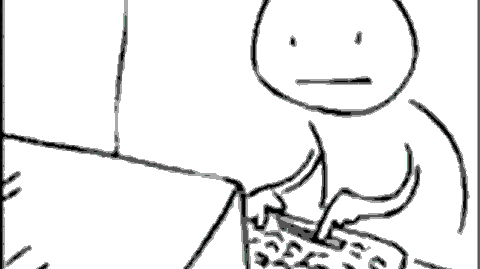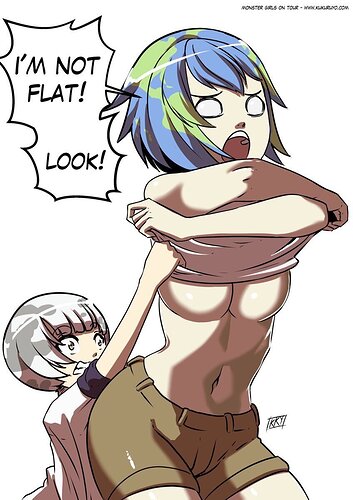And it’s also a thing couples do all the time. Some people don’t understand 
I am just shocked! I tell you. Just Shocked!
Oh cool, 'ats Limmy that is. No one will have a clue about his old clip but, here have a bash. It is exaggerated BTW. Scots are not this bad.
No one posted here so…
do we get bonus points for understanding every word they said?
Im good with our 'ocal accents up 'ere
“Homo Sapien Commentatus”:

I did not think I would enjoy that as much as I did.
Here, have an Earth-chan meme. Also proof that the Earth is not flat.
I’d prefer it if earth-chan were flat.
but not real earth, Gaia-san
also, seeing as though someone mentioned it.
I could swear chan meant “little sister girl”
like Sama means “older grown up boy, sort of like “gentleman””?
im not a master of Japanese but I’ve seen one piece and other animes in Japanese and they use them like titles, and everyone has a different chan or san or sama, yet every white person on twitter uses chan for frigging everyone.
Just to confirm, I am white, and I use twitter.
google-fu helps you kyle-san
http://www.sljfaq.org/afaq/titles.html
(i remember googling “back when” to figure out “who the heck is right” when people kept writing sempai and senpai  -weebs cause much Confucius
-weebs cause much Confucius  )
)
I’ve googled it before I don’t like googling stuff twice, after once you should know, it should be in there. its a much better learning term than just googling it I think.
so how close was I?
How to Use “San,” “Kun,” and “Chan” Correctly When Speaking Japanese
A very familiar term, “~ chan (~ちゃん)” is often attached to children’s names when calling them by their given names. It can also be attached to kinship terms in a childish language.
However, notice you can use おばあちゃん / “obaa-chan” (grandma) and おじいちゃん / “ojii-chan” (grandpa) as well.
Japanese Honorifics
When referring to a third person, honorifics are used except when referring to one’s family members while talking to a non-family member, or when referring to a member of one’s company while talking to a customer or someone from another company—this is the uchi-soto (in-out) distinction. Honorifics are not used to refer to oneself, except when trying to be arrogant (ore-sama), to be cute (-chan), or sometimes when talking to young children to teach them how to address the speaker.
While these honorifics are solely used on proper nouns, these suffixes can turn common nouns into proper nouns when attached to the end of them. This can be seen on words such as 猫ちゃん (“neko-chan”) which turns the common noun neko (cat) into a proper noun which would refer solely to that particular cat, while adding the honorific -chan can also mean cute or small.
Additionally:
In general, chan is used for babies, young children, friends, grandparents and adolescents. It may also be used towards cute animals, lovers, close friends, any youthful woman, or between friends. Using chan with a superior’s name is considered to be condescending and rude.
The proper use is important, to avoid being offensive.
Lastly, a video, if it suits you best:
EDIT: “Chan” starts at 1:50.
(these two are great)
according to my meager google-fu
chan = “children” both sexes, +young females later
san = all, mr, mrs etc, “adults”
sama = formal + higher “rank” + leonardo dicaprio
It’s such an interesting language… and everytime I ask people about its use I get a different answer xD will watch this later :3
leonardo di caprio-sama is a bit much
apparently according to japan it’s not  (Leo-sama)
(Leo-sama)
but i’m gonna take that as the “handsome”/revered part of sama for Leo probably 






